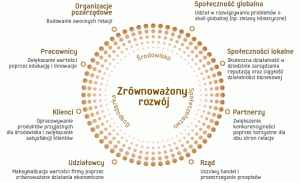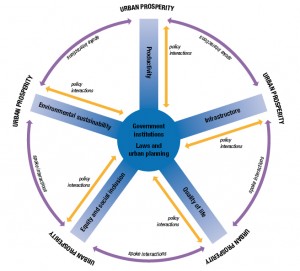„Cities and urban matters addressed by frequently changing dignitaries could not bring themselves to run development policies that would leave sustainable and numerous mementoes or would not hinder the intentions of generations to come”.
Eng. Eugenjusz Porębski, 1930
Ecology Constructively is an educational project managed by Collegium Mazovia Innovation University together with the Polish Chamber of Architects and the Territorial Development Institute. Its aim is to promote sustainable development in groups that have a decisive voice in the shape and future of urban areas.
What Mr. Porębski said nearly a hundred years ago is still relevant. Contemporary expertise in ecology is in-depth and widespread, however in Poland it is not often put into practice. Decision-making groups who create the urban space are driven by their own objectives and are not willing to respect a diverse viewpoint or the common interest.
The key decision-makers are public administration, investors and planners, especially architects and urban designers. They all act within one city space but look at it from a totally different angle. Based on their own studies, Kuhn and Garzillo notice that “systems within which they function, are managed by disparate logic”.
Ecology Constructively is a project about model exchange of experience and capturing the full city context. Two-day meetings of public administration representatives, investors and planners are planned with various activities: a conference, workshops, best practice display and architectural classes for the young.
The city of Wrocław as the venue of our first conference is not accidental. The participants will have a chance to learn about the local cooperation model and assess its practical implementation effects. The project called Nowe Żerniki will serve as an example.
The presentations will include the cutting edge research achievements and practices in terms of sustainable development of urban areas. We are going to trigger a debate whether sustainable development is truly what future generations are going to be grateful for. Is the development always good? What is more important: the development itself or its sustainable outcomes? Is the sustainability better than harmony? The questions come from recent dilemmas of global economy and needs to find a new effects-based economy paradigm.
The panel discussion will pivot on documentary films about the most interesting urban projects in Europe. We will show selected projects together with conclusions that are drawn from their realization. The following subjects will be covered in films:
– Eco Village in Bad Belzig, Germany,
– Renewal of Hamburg Hafen City,
– BedZed Housing in London,
– Daintree Emerald building in Dublin,
– Smart City Project in Aarhus, Danmark
– Revitalization of River Greenfields in Brussels,
– Smart Office buildings in Brussels,
– Safe Shared Space project in Dutch towns and cities.
The workshop session is to explain and understand the roles and missions of particular managers of public space. Through “step in my shoes” games we will try to reveal:
– to investors that the aim of public administration is not to put stumbling blocks in investors’ way
– to architects that their ideas are plausible only if investors can make profit on them,
– to public administration officials that without trusting professionals it is impossible to find extraordinary solutions.
The debate will surely go beyond the three stereotypes from the Polish reality.
During the next two conferences in Gdańsk and Warsaw we will follow the debate on theoretical and practical models of sustainable development of urban areas. We will present more good practices from European countries. But above all, we will keep on encouraging decision makers to talk constructively.
Information about the project and conference registration can be found on www.ekologiakonstruktywnie.pl
If you have any questions please do not hesitate to contact us on eko@mazovia.edu.pl
Project Coordinator
Arch. Mariusz Szabłowski






